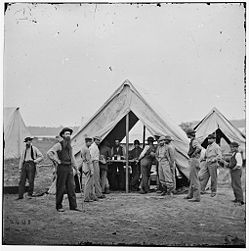Sutler
Sutlers sold wares from the back of a wagon or a temporary tent, traveling with an army or to remote military outposts.
It meant originally "one who does dirty work, a drudge, a scullion," and derives from zoetelen (to foul, sully; modern Dutch bezoedelen), a word cognate with "suds" (hot soapy water), "seethe" (to boil) and "sodden".
Generally, the sutlers built their stores within the limits of an army post or just off the defense line, and needed to receive a license from the Commander prior to construction.
They frequently operated near the front lines and their work could be dangerous; at least one sutler was killed by a stray bullet during the Civil War.
Sutlers, frequently the only local suppliers of non-military goods, often developed monopolies on critical commodities like alcohol, tobacco, coffee, or sugar and rose to powerful stature.

